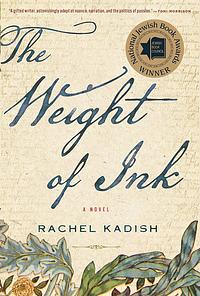Take a photo of a barcode or cover
emotional
mysterious
reflective
medium-paced
A great sweeping story connecting people from the 1600s to present day
challenging
dark
emotional
hopeful
inspiring
reflective
slow-paced
Plot or Character Driven:
Character
Strong character development:
Yes
Loveable characters:
Yes
Diverse cast of characters:
Yes
Flaws of characters a main focus:
No
Graphic: Grief, Fire/Fire injury
Moderate: Racism, Rape, Violence
informative
inspiring
reflective
slow-paced
Plot or Character Driven:
Character
Strong character development:
Yes
Loveable characters:
Complicated
Diverse cast of characters:
Yes
Flaws of characters a main focus:
Yes
Looking at reviews, I feel like I read a different book than other people. I raced through this book, couldn’t put it down, found it really suspenseful. I loved the philosophical ideas, the Jewish history, the historical setting that I knew little about. Helen was an interesting, difficult character and as a recent grad student I related to poor sad Aaron too. In the end, I don’t really find the 17th c. story very plausible, especially the whole last section, and the ending twist made me roll my eyes hard. But the enjoyment of the read makes up for all that.
challenging
mysterious
reflective
slow-paced
Plot or Character Driven:
A mix
Strong character development:
Yes
Loveable characters:
Yes
Diverse cast of characters:
Yes
Flaws of characters a main focus:
Yes
A sweeping, exquisitely written saga of a female Jewish scribe in 17th century London and the aging professor and restless graduate student working to unravel her story centuries later. I sank right into this book and found it so absorbing. I especially loved the way the story writes about history, the complex and affecting characters, and finding a book about Jewish history that doesn't center around the Holocaust. If you're looking for a Possession read-alike or a book to get lost in, this might be just the thing.
An engrossing read, requiring attention, and quite enjoyable. A cache of late 17th Century documents, a genizah or archive of Jewish documents, is found in 2000 hidden in a stairwell in a home in Richmond-on-the-Thames. Two scholars, Helen at the very end of her career and Aaron at the beginning of his, begin examining them only to discover they relate to the Restoration when the Portuguese Sephardic Community was being openly re-established in London after centuries of banishment. This story is told in alternating chapters with that of Ester, an orphan in the home of a blind rabbi tasked with guiding and educating this congregation and its sons in 17th Century London. Ester becomes the rabbi's scribe, having been educated against custom and acceptable practice for women. Ester hungers for knowledge, being possessed of a brilliant mind capable of deep philosophical analyses, and a person of great strength. Both stories gradually reveal a compelling historical portrait of a community during the Restoration, including the devastating plague of 1665-1666, while also showing us the personal journeys and epiphanies of our 21st Century scholars. And quite a bit is revealed of the politics of academia along the way.
While this is definitely historical fiction about Restoration London, I hazard to suggest that it is also about women as intellects and philosophers, women academics suppression both overtly historically (denied education) and more subtley in contemporary academia (Helen being supplanted by the (male) former student of the (male) department chair as first scholar studying the genizah). Yet the story also reveals how gifted intellectual women persisted and continue to do so.
I did find sections slow, and the philosophical arguments set out by Ester in the letters she is scribing were a bit much, but there are also many ironies and even inventive leaps that balance out those passages. And I found the historical story revealed to be fascinating.
If you loved Possession by A.S. Byatt, this book is for you. I would also suggest The Last Watchman of Old Cairo by Michael Lukas for the story of another ancient geniza, and Hunger's Brides by Paul Anderson for a similar dual story about a 20th Century Canadian scholar and her subject, Sor Juana Inez de la Cruz, a late 17th Century nun in Mexico, who was one of the great poets and intellects of the time.
While this is definitely historical fiction about Restoration London, I hazard to suggest that it is also about women as intellects and philosophers, women academics suppression both overtly historically (denied education) and more subtley in contemporary academia (Helen being supplanted by the (male) former student of the (male) department chair as first scholar studying the genizah). Yet the story also reveals how gifted intellectual women persisted and continue to do so.
I did find sections slow, and the philosophical arguments set out by Ester in the letters she is scribing were a bit much, but there are also many ironies and even inventive leaps that balance out those passages. And I found the historical story revealed to be fascinating.
If you loved Possession by A.S. Byatt, this book is for you. I would also suggest The Last Watchman of Old Cairo by Michael Lukas for the story of another ancient geniza, and Hunger's Brides by Paul Anderson for a similar dual story about a 20th Century Canadian scholar and her subject, Sor Juana Inez de la Cruz, a late 17th Century nun in Mexico, who was one of the great poets and intellects of the time.
adventurous
dark
emotional
hopeful
mysterious
medium-paced
Plot or Character Driven:
A mix
Strong character development:
Yes
Loveable characters:
Yes
Diverse cast of characters:
Complicated
Flaws of characters a main focus:
Complicated
challenging
emotional
reflective
slow-paced
Plot or Character Driven:
A mix
Strong character development:
Yes
Loveable characters:
Complicated
Diverse cast of characters:
No
Flaws of characters a main focus:
No





